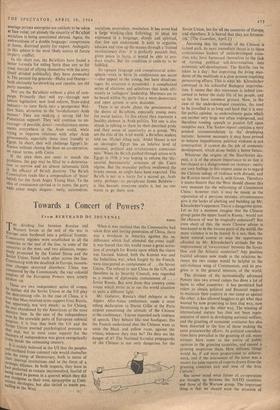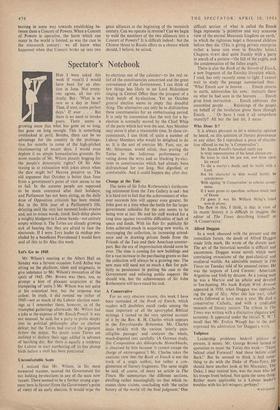Towards a Concert of Powers?
From BERTRAND DE JOUVENEL
Im dividing line between Russian and Western forces at the end of the war in Europe soon hardened into a political frontier. Communist regimes were established in all the countries to the east of the line, in none of the countries to the west; and two alliances, respec- tively promoted by the 'United States and the Soviet Union, faced each other across the line.
momen- tous with the deadlock in Europe, changes occurred elsewhere. China was conquered by the Communists; the vast colonial empires of the European Powers were utterly broken up. These are two independent series of events. In neither did the Soviet Union or the US play the determining role. In the case of China, it is true that Mao received some support from Russia, Litt apparently not very much: as for Chiang, he was abandoned by the Americans at the most decisive time In the case of the independence won by the erstwhile parts of European colonial empires, it is true that both the US and the Soviet Union exerted psychological pressure to that end, but in most cases support for the from of independence was given energetically Itorn inside the colonising country. It is Widely believed in the US that the peoples enfranchised from colonial rule would thereafter loin the camp of Democracy, both in terms of their internal institutions and in the form of a strategic alliance. In both respects, they have in act preferred to remain uncommitted, fearful of not used as pawns in a. quarrel which they did nmot recognise as their own, unreceptive ICI Com- munist ideologies, but also untied to tenets pre- vailing in the West. When it was realised that the Communists had taken firm and lasting possession of China, there was a revulsion in America against the in- difference which had attended, the event itself. It was feared that this would mean a great accre- tion of strength for Russia upon which the vision was focused. Indeed, both the Korean war and the Indochina war, when fought by the French, were interpreted as containment of ... the Soviet Union. The refusal to seat China in the UN, and' therefore in its Security Council, was regarded as a means of diplomatic containment of . . . Soviet Russia. But now from that country come voices which invite us to see the world situation in quite a different light. ' Mr. Gafurov, Russia's chief delegate at the Algiers Afro-Asian conference, made a most telling declaration to Darsie Gillie at the Paris airport concerning the attitude of the Chinese at the conference: 'I never expected such violence of speech. They behave like real hooligans. Do the French understand that the Chinese want to unite the black and yellow races, against the whites, whoever they may be? Do they see the danger of it? The National Socialist propaganda of the Chinese is not only dangerous for the Soviet Union, but for all the countries of Europe, and elsewhere. It is hatred that they are ferment- ing.' (The Guardian, April 2.) Assuming that the attitude of the Chinese is indeed such, its most immediate threat is to those conscientious leaders of underdeveloped coun- tries who have harnessed themselves to the task of turning political self-determination into economic self-development. The Bastille can be taken in a day: but improving the living stan- dards of the multitude is a slow process requiring persevering efforts. This is what Mr. Khrushchev conveyed in his colourful Budapest improvisa- tion. It seems that this statesman is indeed con- cerned to better the daily life of his people, and so far we have common ground. Now, in the case of the underdeveloped countries, the road to be travelled is so long and hard that it is easy for public opinion to underestimate gains which are neither very large nor often widespread, and therefore rousing appeals to passion fall upon receptive ears. The Suslov report contains a very pointed recommendation to the developing nations: however necessary it may have proved to remove impediments, political violence is not constructive; it cannot do the job of economic development, which alone builds a better future. Whatever the origins of the Sino-Soviet dis- pute, it is of the utmost importance to us that it has shaped as a disagreement on violence: surely our own feelings in this respect cause us to regard the Chinese eulogy of violence with distaste, and the Russian recoil from it, with favour. Therefore it seems bizarre that the West should choose this very moment for the welcoming of Communist China : however truly it may be meant as the reparation of a previous mistake, circumstances give it the looks of abetting and building up Mr. Khrushchev's opponent. This is a dangerous game. Let us for a moment imagine that the Chinese group gains the upper hand in Russia : would not the chances of war be tragically enhanced? But even short of this, the more Chinese advice is hearkened to in the various parts of the world, the more violence is to be feared. Is it not, then, the more natural course to seize the opportunity afforded by Mr. Khrushchev's attitude for the improvement of 'co-existence' between the Soviet bloc and the Atlantic countries? Any positive fruitful advance now made in the relations be- tween the two camps would be helpful to the anti-violence wing of Communism, and its pro- gress is in the general interests of the world. The division of the economically advanced Powers into two armed camps has done a lot of harm to other countries: it has permitted bad rulers to obtain political and financial support to maintain their country in one camp as against the other; it has allowed hagglers to get what they wanted by now promising to lean that way, now threatening to go the other way. The winning of international stature has thus not been repre- sentative of merit in developing national welfare; and the granting of economic assistance has also been distorted to the loss of those making the most praiseworthy efforts. As political considera- tions have prevailed in the granting of aid, many misuses have come to the notice of public opinion in the granting countries, and caused a growing scepticism there. How different things would be, if aid were proportional to achieve- ment, and if the assessment of the latter was a matter for joint reports of experts drawn from the granting countries east and west of the Iron Curtain! But never mind what forms of co-operation are thought up between the NATO countries and those of the Warsaw group. The important thing is that we should seize the occasion of moving in some way towards establishing be- tween them a Concert of Powers. When a Concert of Powers is operative, the harm which can occur in the world is limited, as was the case in the nineteenth century : we all know what happened when that Concert broke up into two
great alliances at the beginning of the twentieth century. Can we operate in reverse? Can we begin to weld the members of the two alliances into a Concert of Powers? It is difficult indeed : but the Chinese threat to Russia offers us a chance which should, I believe, be seized.







































 Previous page
Previous page